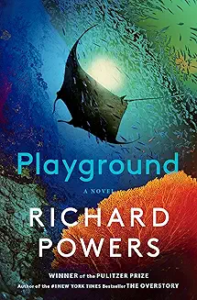Playground by Richard Powers 2024
I have been recommending Richard Powers as one of the best writers in contemporary America since I first read his book ‘The Echo Maker’ the National Book Award winner and finalist for the Pulitzer Prize in 2006. The man simply is a fantastic story teller and prose craftsman. In his 14 novels, including the spectacular “Overstory” which won the 2019 Pulitzer Prize and was short-listed for the Booker, he has explored major issues and themes in contemporary American society. From the long term impact of head trauma to his novel about artificial intelligence 20 years before anyone had heard of Nividia or Chat Box, from his novel about environmental toxins and cancer to this book’s exploration of man’s pollution and destruction of the oceans and the forests, Powers has been an immense presence in American fiction though still relatively unknown to many readers.
I have no explanation for his relative anonymity despite publishing award winning books for the last 30 years, but with ‘Overstory’ , “Bewilderment”, and “Playground”, I think this MacArthur Award winner may finally be getting the recognition he deserves.
“Playground” is a remarkable novel. As in “Overstory”, the book begins slowly as Powers introduces us to this startling cast of characters one at a time. We meet Rafi Young, a Black adolescent living in public housing with his father a firefighter and his mother a bus driver in Chicago. We meet Todd Keane, another adolescent but one living in a mansion in Evanston (the Chicago suburb where Powers was born) near the lake where is father, a trader in the commodity market, and mother fight constantly. We meet Ina Aroita living on a tiny island in French Polynesia who joined Rafi and Todd as undergraduates at the University of Illinois (Powers’ alma mater) and fell in love with one while both fell in love with her. Along the way, other characters are introduced, especially vivid portrayals of the inhabitants of Makatea, an island which had been plundered for its phosphate by the French and whose 82 inhabitants including Rafi and Ina are faced with the question of whether to welcome a new development/exploitation project by a brilliant AI entrepreneur, none other than Todd. Powers, as he usually does, manages to introduce a health issue by having one of the lead characters disappearing into Lewey Body dementia.
Once you get through the first 20 pages (Don’t quit!!!), the book carries you along with inexorable force. Gaming from chess to GO to the virtual reality of AI is a major theme as is the despoliation of the earth’s oceans by plastic refuse. Though I found the ending to be a bit of a letdown, it was only because I was swept along through the first 350 pages with barely a chance to catch my breath. Don’t miss this book and don’t miss any opportunity to pick up an earlier work by Powers. He immerses himself in the details of the science and its impact on society and individuals to a degree that is rare in novelists. He was so changed by his work on ‘Overstory’ that he moved to the Appalachian Mountains, living in the environment that he discovered in writing that book. Is he next going to move to a small island in the Pacific?
I urge you to get to know this remarkable writer. Whether he adds a Nobel Prize to his National Book Awards, Pulitzers, Bookers, etc remains to be seen, but I would not be surprised. He deserves it.



